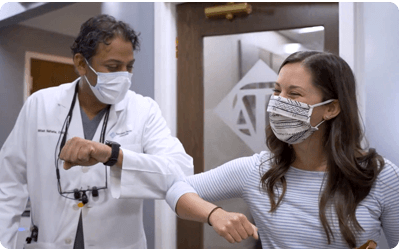Migraine-like headaches. Jaw and neck pain. Worn teeth. These are complaints that frequently prompt people to schedule a dental appointment.
They often aren’t concerned about the underlying cause; they simply want us to alleviate the pain. But successfully identifying and treating the cause is necessary for us to fix the immediate issue and help prevent future problems.
Bite problems can be caused by crowded teeth, missing teeth, unhealthy oral habits, or improper jaw growth.
One in eight Americans suffers from headaches severe enough to interfere with their normal lifestyle, according to the American Academy of Craniofacial Pain. Muscle tension is responsible for about 80 percent of headaches. Your bite could be the cause of the muscle tension that is leading to your chronic headaches.
“Teeth that are in the wrong positions can cause headaches that strongly resemble and are often misdiagnosed as migraines, because if they don’t align properly, they don’t allow muscles in your jaw, neck and shoulders to relax,” says Dr. Nitish Nahata.
The AACP identifies the following as signs that your headaches may have a dental origin:
- Pain behind your eyes
- Sore or tired jaw muscles when you wake up in the mornings
- Teeth grinding
It may seem unlikely that malocclusion – bad bite – could cause so much trouble, until you realize that your upper and lower teeth come together firmly more than 2,000 times a day to brace your jaw against the skull each time you swallow.
“If your bite is unstable due to teeth that are out of alignment or teeth that are missing due to decay, disease or trauma, your muscles must work harder to bring your teeth together,” Dr. Nahata says. “Believe it or not, all that tension and discomfort is often no more than a sore and overworked muscle.”
A bad bite also can cause your teeth to wear prematurely. We sometimes diagnose prematurely worn teeth during comprehensive exams, and patients will question the need to address it when they aren’t experiencing any pain as a result.
“I equate it to a set of old tires,” Dr. Nahata says. “Just like tires that experience wear and become more prone to damage, worn teeth hit at different spots than they’re designed to. When they wear too much, they can break, fracture or crack. Sometimes the fix is as simple as a ‘tire alignment,’ and sometimes it requires a whole new set.”
Signs of bite problems include teeth that are worn, broken, cracked, or sensitive to cold. Routine dental checkups and professional cleanings mean we can identify these problems, and less invasive measures can be taken to correct them.
Dental Treatment
If you suspect that headaches, muscle pain and tooth wear might be caused by your bite, please call us. We can examine your teeth, muscles and jaw joints and provide a diagnosis.
Treatment may involve correcting your bite through orthodontic treatment, or restorative dentistry to replace missing teeth and return form and proper function to cracked or broken teeth. Porcelain crowns often are used to repair damaged or cracked teeth. Enamel reshaping can correct uneven teeth to reshape the way teeth come together. If we find that the damage being caused to your teeth primarily occurs at night, sometimes a night guard can work to protect the teeth and balance the bite, allowing those muscles some much-deserved R&R.
All of these services are provided in our office by our skilled Tewksbury Dental Associates dentists, making treatment convenient and preventing you from having to be referred outside our practice to a different specialist.
If you live in Chelmsford, Billerica or other neighboring communities, we invite you to call us to schedule an appointment. We want to help keep your teeth healthy and your body pain-free.






